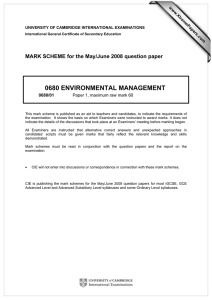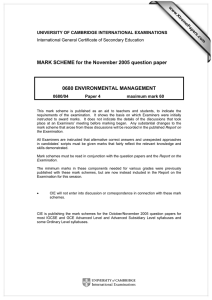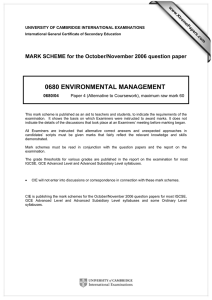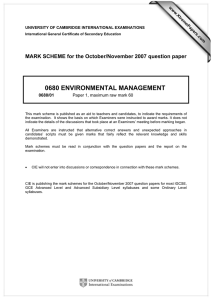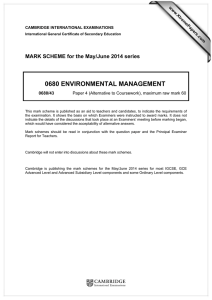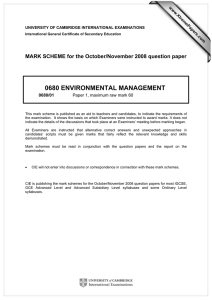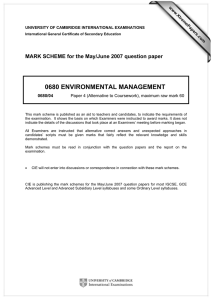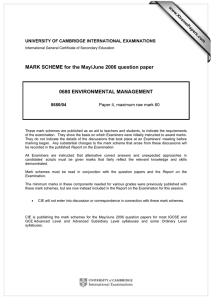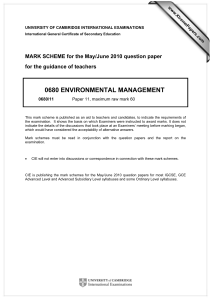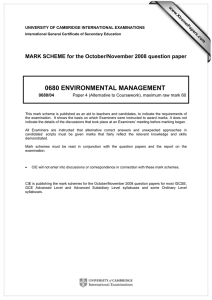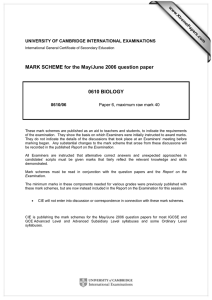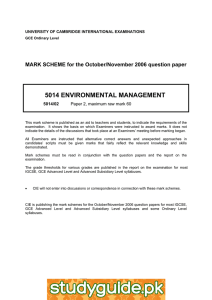MARK SCHEME for the May/June 2006 question paper 0680 ENVIRONMENTAL MANAGEMENT www.XtremePapers.com
advertisement
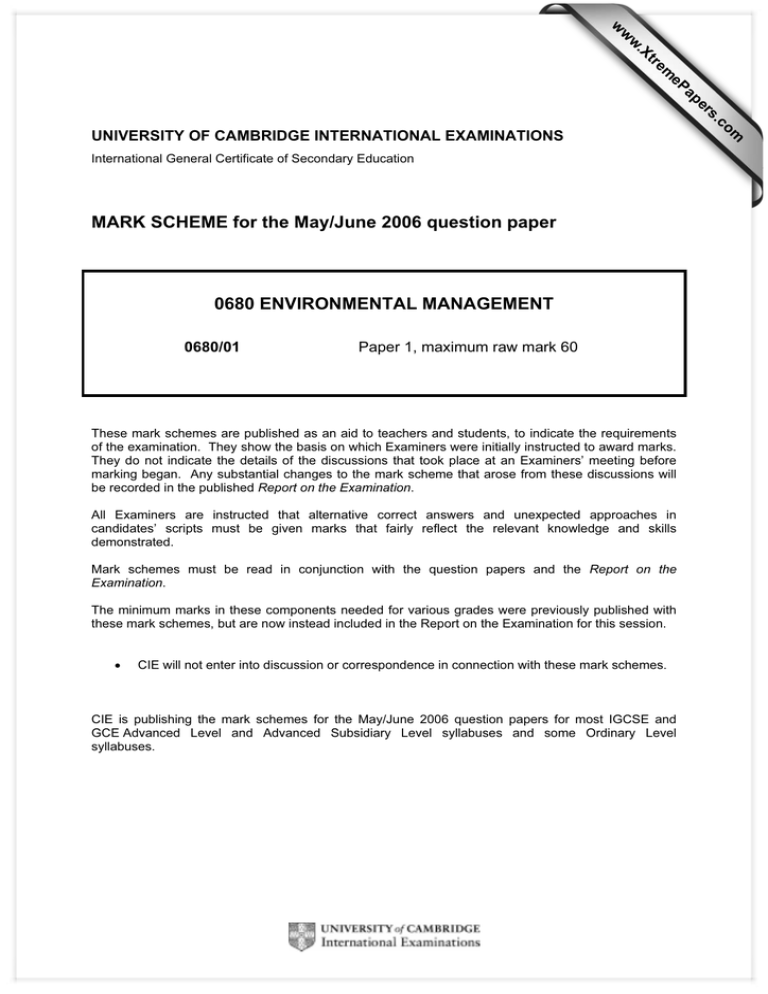
w w ap eP m e tr .X w International General Certificate of Secondary Education MARK SCHEME for the May/June 2006 question paper 0680 ENVIRONMENTAL MANAGEMENT 0680/01 Paper 1, maximum raw mark 60 These mark schemes are published as an aid to teachers and students, to indicate the requirements of the examination. They show the basis on which Examiners were initially instructed to award marks. They do not indicate the details of the discussions that took place at an Examiners’ meeting before marking began. Any substantial changes to the mark scheme that arose from these discussions will be recorded in the published Report on the Examination. All Examiners are instructed that alternative correct answers and unexpected approaches in candidates’ scripts must be given marks that fairly reflect the relevant knowledge and skills demonstrated. Mark schemes must be read in conjunction with the question papers and the Report on the Examination. The minimum marks in these components needed for various grades were previously published with these mark schemes, but are now instead included in the Report on the Examination for this session. • CIE will not enter into discussion or correspondence in connection with these mark schemes. CIE is publishing the mark schemes for the May/June 2006 question papers for most IGCSE and GCE Advanced Level and Advanced Subsidiary Level syllabuses and some Ordinary Level syllabuses. om .c s er UNIVERSITY OF CAMBRIDGE INTERNATIONAL EXAMINATIONS Page 1 1 Mark Scheme IGCSE – May/June 2006 Syllabus 0680 Paper 01 (a) (i) Kenya [1] (ii) Brazil [1] (b) (i) cholera/typhoid/avp [2] (ii) malaria/bilharzias/avp [2] (c) local people; 2 personal hygiene points most likely here, washing, boiling water; not using as toilet; reason [1] govt. [1] provision of good water disposal (sewerage system); compost toilets; reason [2] (a) (i) hole/fissure/crack owtte in earth's crust; through which molten lava/rock/ash erupts; cone shaped mountain on surface (ii) disease; named disease; lack of food; contaminated water; lack of housing; communications; travel AVP any [2] (iii) thought it was end of cycle in 1631/distant past; fertile soil; therefore plants grow well; bigger crop yield; mineral deposits; fatalism; always have any [3] (b) better buildings; drills; emergency supplies in advance; better prediction 3 4 [2] (a) (i) diagram as shown with no holes at either pole any [3] [1] (ii) CFC gases/aerosols/fridges; destroy ozone [2] (iii) UV causes cancer; UV kills crops; blindness; cataracts; immune system suppressed; AVP [4] (b) stop using CFC driven aerosols; use non CFC fridge coolants; do not export; import such products [3] (a) (i) 23% (± 1%) [1] (ii) 5% [1] (iii) more old; less young (owtte); less working [3] (b) (i) deforestation; soil erosion; desertification; sewage pollution (owtte) AVP (ii) education about family planning; FP clinics; supply free contraceptives; provide pensions; AVP © University of Cambridge International Examinations 2006 [2] [3] Page 2 5 Mark Scheme IGCSE – May/June 2006 Syllabus 0680 Paper 01 (a) (i) charcoal/wood [1] (ii) oil [1] (iii) renewables [1] (iv) renewables [1] (v) wind/tidal/wave/solar (not HEP as on sep)/biofuels/avp [2] (b) (i) it will go down (ii) waste dangerous; accidents huge problems; run out of fuel; thermal pollution [1] [3] (a) (i) niche role/function in ecosystem; e.g. from diagram habitat place where organism lives; e.g. from diagram energy flow movement of energy by feeding; e.g. from diagram (ii) producers B consumers C solar A (b) (ii) farmland; buildings; roads; mining; logging; avp © University of Cambridge International Examinations 2006 [4] [3] any [3]
